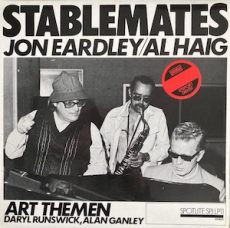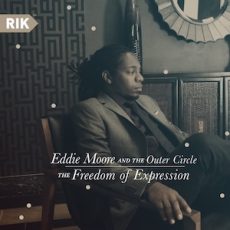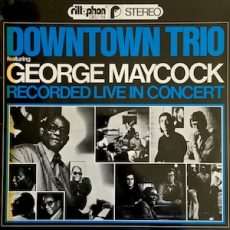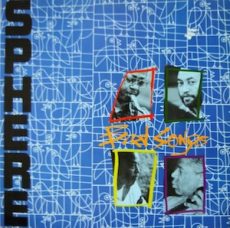
Requisites
Stablemates ~ Jon Eardley and Al Haig | By Eddie Carter
You really know your godchildren truly care and love you when they surprise you for your birthday with an album by two artists whose music you’re aware of, yet whose records have never found a place in your library. This morning’s spotlight shines on flugelhorn and trumpet player Jon Eardley, who was passing through London on a brief 1977 tour and pianist Al Haig, who was in town to visit friends. The two musicians seized the moment to head into the studio to record their only album together, Stablemates (Spotlite Records SPJ LP11). It was released two years later, and rounding out the ensemble are Art Themen on tenor sax, Daryl Runswick on bass, and Alan Ganley on drums. My copy of this album is the 1979 U.K. stereo release.
The first side opener, Tangerine by Johnny Mercer and Victor Schertzinger, begins with Al’s upbeat piano intro to Jon’s lively melody. Art kicks off the opening solo briskly, then Al flows smoothly into the following reading. Jon entersnext with a strong, assertive tone. Art and Jon share a final conversation leading back to the theme’s reprise and close. Speak Low by Ogden Nash and Kurt Weill raises the temperature with the quintet’s swinging melody. Themen opens the solos with an inspired improvisation that sets the tone. Eardley follows with plenty of bounce and effervescence on the second statement. Themen is off to the races next with impeccable precision, then Runswick and Ganley engage in a spirited exchange until the theme’s restatement fades out.
‘Round Midnight by Bernie Hanighen, Thelonious Monk and Cootie Williams is a quartet showcase that opens with Al and Daryl’s pensive introduction ahead of Jon’s tender melody. Al begins the opening solo with dreamlike softness, then the pace moves upward slightly for Jon’s elegant interpretation before the ensemble’s gentle ending. The second side gets underway with the pianist’s soothing introduction to Embraceable You by George and Ira Gershwin. Eardley states the gentle melody with Themen. In the first solo, Haig offers a tender, thoughtful statement with a soft touch of elegant beauty. Eardley truly shines in the closing reading with notes so deeply heartfelt that it’s bound to move you to tears, leading to Themen’s closing chorus and a gentle climax.
Don’t Blame Me by Dorothy Fields and Jimmy McHugh receives a gorgeous treatment by the quintet, beginning with Jon’s slow-paced theme that radiates inviting warmth, and Art’s perfectly placed inserts. Al leads off, skillfully blending composure and gentleness, before Art continues this lovely standard with a solo that truly touches the spirit. Jon delivers an exquisitely soft, poignant horn passage preceding the theme’s return. The beat moves upward on final time for Eardley’s theme to Love Walked In by George and Ira Gershwin. Themen opens the solos with an energetic drive, then Haig contributes a robust interpretation. Eardley matches the intensity with swift execution, and Ganley and Runswick meet on common ground in the closer, leading to the theme’s reprise and climax.
Tony Williams produced the album, and Steve Waldman served as the recording engineer. It delivers an exceptional soundstage, as though the ensemble is performing live in your listening room. The mix is impressively balanced, offering remarkable clarity and fidelity from your speakers. Stablemates is one of six albums Jon Eardley led as a leader, and he contributed as a sideman on ten additional records. Al Haig, meanwhile, led twenty-five albums and played as a sideman on eight more. If you haven’t yet experienced the artistry of Jon Eardley or Al Haig, I highly encourage you to seek out Stablemates on your next search for great jazz records. This outstanding album invites fresh appreciation with each play and remains as relevant today as it was over forty years ago!
~ Don’t Blame Me, Embraceable You, Love Walked In, ‘Round Midnight, Speak Low, Tangerine – Source: JazzStandards.com
© 2025 by Edward Thomas CarterMore Posts: choice,classic,collectible,collector,history,instrumental,jazz,music,piano,trumpet

Daily Dose Of Jazz…
Eddie Moore was born in Houston, Texas on September 14, 1940 and began his musical journey at Texas Southern University where he earned a Bachelors in Arts and immersed himself in the Houston music scene. He relocated to Kansas City, studied under Bobby Watson at the University of Missouri-Kansas City and received a M.A in Jazz Studies.
He formed a jazz fusion group Eddie Moore & The Outer Circle in 2012, with diversity and inclusiveness defining him as an artist. His debut album, The Freedom of Expression, was released in 2013. With a performing and visual arts curator he created an experimental platform in partnership with Charlotte Street that pairs time-based artists, producers and musicians.
Eddie has received awards and a 2017 residency at the Kemper Museum of Contemporary Art. He has composed music that has been featured commercially for Sprint, Netflix’s Queer Eye, Morgan Cooper’s short film Room Tone, and Peacock’s Bel-Air.
He has shared the stage and recorded with Tia Fuller, Pam Watson, Logan Richardson, Maurice Brown, Boys II Men, Brian Blade and the Fellowship, John Baptiste, Erykah Badu, Mos Def, Bilal, Ledisi, Chantae Cann, Krystal Warren, Andre Hayward, Tivon Pennicott, and Various Blonde.
As an educator his passion for teaching sent him on a course as a jazz lecturer at the University of Kansas, created a pilot Incubator, Tribe Studios, which programs master classes, music business meet-ups, and provides creative/maker space for musicians and visual artists.
Pianist and bandleader Eddie Moore is an integral member of the music community in Kansas City, as well as an advocate for change and resources for professional artists.
More Posts: bandleader,educator,history,instrumental,jazz,music,piano

Daily Dose Of Jazz…
George Maycock was born on September 9, 1917 in Colón, Panama. He played in Panama with his band Chimbombo Swingjazz since 1940. With the dance and show music of Cuban Jaime Camino, he and his band came to Spain in 1949.
Together with the trumpeter Boogie Sergeant and drummer Big Fletchit, who played at Camino and stayed in Europe, they became the Chic Combo with the Jamaican bassist Noel George Gillespie. They operated from Basel, Switzerland then from Cologne, Germany to go on tour. On occasion saxophonist Jack Poll played with the quartet, before Wilton Gaynair joined in 1956, creating the George Maycock Quintet.
This band played modern jazz and continued to perform regionally and was rated the best black combo in this country by the 1980 Rheinische Post 1980. Later, Maycock moved to Düsseldorf, Germany where he was in the center of the local jazz scene. In the 1960s he had increasingly begun playing in dance bands. During the Seventies he toured with Fletchit and Ali Haurand in the trio and played with Jörn Behrens and Ralph Kleine-Tebbe in the Düsseldorf area.
Pianist George Maycock, who was one of the first Black musicians to perform authentic jazz in Central Europe after the Second World War, not on concert tours, but through intimate performances in jazz clubs, died on August 20, 1979 in New York City, New York.
More Posts: bandleader,history,instrumental,jazz,music,piano

ALEX MURPHY TRIO
Alex Murphy Trio feat. Gabrielle Cavassa
Hailing from Chicago, Illinois Alex grew up in a family of musicians with parents who emphasized musical exploration at an early age. He grew up where the arts were strongly supported and he had the support to grow his passion for jazz. That passion led him into continued study at DePaul University in Chicago where he was under the tutelage of Ron Perrillo and Dana Hall. Alex has studied with masters Aaron Goldberg, Bill Charlap, Mark Colenburg, and Pascal LeBoeuf.
Gabrielle Cavassa is a singer and composer, recently signed to Blue Note Records. She was ushered into the spotlight through her collaboration with renowned saxophonist Joshua Redman on his critically acclaimed 2023 record ‘where are we’. In a five-star album review by Downbeat, Cavassa is hailed as “a young singer with a deep, rich, and fragile voice…a star in the making.”
The Band:
Alex Murphy – piano
Gabrielle Cavassa – vocals
Lex Warshawsky – bass
Marlon Patton – drums
Cover: $16.00
More Posts: bandleader,club,genius,instrumental,jazz,music,piano,travel,vocal

Requisites
Bird Songs ~ Sphere | By Eddie Carter
Sphere initially came together to celebrate the music of Thelonious Monk; however, the quartet soon expanded its repertoire to include original albums as well. I first heard “I Didn’t Know What Time It Was” on WNOP, Cincinnati’s then-jazz station, and I immediately purchased the album right after work. Listening to it again a few nights ago inspired me to share my thoughts this morning. Bird Songs (Verve Digital 837 032-1), the quartet’s sixth release, is an excellent showcase of the underrated artistry of tenor saxophonist Charlie Rouse. Also on board are Kenny Barron on piano, Buster Williams on bass, and Ben Riley on drums, as the quartet celebrates the legacy of Charlie Parker. My copy of this album is the 1988 U.S. digital stereo release.
Side One opens with the quartet’s introduction and theme to Red Cross. Kenny sparkles with inventive runs and unexpected turns in the opening statement. Charlie follows, paying homage to Bird’s rhythmic playfulness, driven by Buster and Riley’s groundwork into the group’s rousing closing chorus. I Didn’t Know What Time It Was by Richard Rodgers and Lorenz Hart is a beloved jazz standard that was a staple in Parker’s repertoire. Williams and the rhythm section set the scene elegantly. Rouse enters next with a smoky, reflective melody, before taking flight in the first solo. The trio’s brief, tasteful interlude clears the way for Barron’s swinging interpretation. After a second trio interlude nudges the tempo forward, Rouse returns for the reprise, and the song gently fades out with the trio’s subtle touch.
The ensemble moves into Dewey Square next, with the rhythm section’s introduction paving the way for Charlie todeliver the melody. Buster begins the solos with a delightfully spirited walk, then Charlie steps into the second statement with a passionately frisky tone that’s crisp, well-structured and executed vivaciously. Kenny tackles the closing reading with youthful zest that’s right on the beat. Ben adds a concise comment during the theme’s reprise and exit. Moose The Mooche shifts the energy upward to begin Side Two with the quartet’s brisk introduction and theme. Rouse fires off the first solo with an infectiously cheerful solo. Barron leaves a memorable mark in the second reading, then Riley takes the spotlight next with youthful vigor. Barron places a few inserts during the theme’s restatement.
Barbados showcases Parker’s take on the calypso rhythm, infused with a bebop twist. The quartet’s melody is joyous, setting the stage for Charlie’s opening solo, which captures the tune’s Caribbean sunlight. Buster walks with a buoyant swagger next, then Kenny weaves a zesty spell with uplifting confidence. Ben evokes the gentle ebb and flow of island waves, carrying the quartet to the closing chorus. The ensemble’s brisk, buoyant introduction to Ah-Leu-Cha leads to an exuberant melody. Rouse draws on his robust tone and melodic inventiveness in the first solo. Barron opens the following reading with playful fragments derived from the central theme. Williams steps forward last, threading a stream of flawlessly constructed musical thoughts until the quartet reconvenes for the melody’s return and climax.
The album’s closer, Quasimodo, slows the pace one final time, for the group’s medium theme. First up is Kenny, who unfolds his solo gradually, with lines marked by crisp articulation and a deft touch. The baton then passes to Charlie, who enters with a relaxed warmth and expressiveness. He listens and responds to the rhythm section, ahead of the theme’s restatement and finale. Joanne Klein and Sphere produced the album, with Richard Seidel serving as executive producer. Rudy Van Gelder was behind the recording dials, and the album was recorded directly to two-track digital using the Sony 3402 DASH Reel-to-Reel Recorder. The album’s sound quality possesses a superb soundstage that emerges from your speakers as if the musicians are positioned directly in front of your sweet spot.
Bird Songs was the final recording Charlie Rouse made with the quartet, as he sadly passed away from lung cancer eight months later, on November 30, 1988, at the age of 64. The ensemble delivers a tight and cohesive performance throughout, and this is truly one of those thoughtfully crafted sessions that invites listeners to return again and again. For anyone who treasures bebop, I enthusiastically suggest adding Bird Songs by Sphere to your library during your next visit to the record store. The album serves as a stirring homage to Charlie Parker, with four remarkable musicians breathing new life into his legacy, creating an experience rich in pure joy, surprise, and profound artistry!
~ I Didn’t Know What Time It Was – Source: JazzStandards.com
~ Postscript Excerpt: DASH – The Digital Audio Stationary Head standard is a reel-to-reel digital audio tape format introduced by Sony in early 1982 for high-quality multitrack studio recording and mastering, as an alternative to analog recording methods. Source: Wikipedia.org
© 2025 by Edward Thomas Carter
More Posts: bass,choice,classic,collectible,collector,drums,history,instrumental,jazz,music,piano,saxophone



